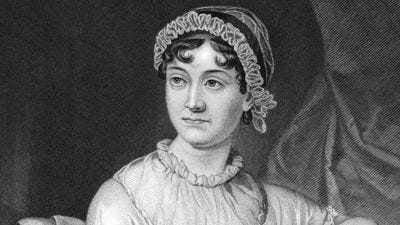Jane Austen: The Woman Behind the Writing
Who was Jane Austen, and why do millions still read her novels today?
Don’t forget: The Pride and Prejudice book discussion will take place this weekend (Sunday 2nd March) at 8pm GMT/3pm EST. Looking forward to seeing you all there!
Jane Austen is an English novelist born in Hampshire, 1775. She is mostly known for her six novels which interpret and critique the English landed gentry of the 18th century.
Though they contain strong elements of romance, her novels are primarily social satire and tales of morality. It is this use of social commentary, wit and irony that has earned her significant acclaim amongst many critics, scholars and readers.
Since her death in 1817 at the age of just 41, Austen’s novels have rarely been out of print. The biggest change in her reputation happened in 1833, when Richard Bentley’s Standard Novels series republished her work, and she has been republished countless times since then.
Her work has been adapted into numerous films and miniseries and are studied in schools across the planet, meaning that her novels remains as part of our literary consciousness some 200 years on from when they were written.
Who was she?
Jane Austen was born in Steventon in the British county of Hampshire where her father, Reverend George Austen, was rector. She was one of eight children with six brothers and a sister, Cassandra, who was her closest companion throughout her life.
George’s wife and Jane’s mother, also named Cassandra, were both members of the landed gentry, which meant that they were individuals who owned lots of land, and earned from it as a result by leasing it out to farmers. Cassandra is recorded as having been a woman of wit, famed for her ability to tell many great stories.
At the age of six, Jane and her elder sister Cassandra were sent away to school, initially in Oxford and later in Southampton, before being brought home after a fever broke out in the town and the girls became ill. After this, they attended school in Reading, where they learnt to read and write as well as French, history, geography and arts such as music and dancing. After this, they were educated privately at home.



